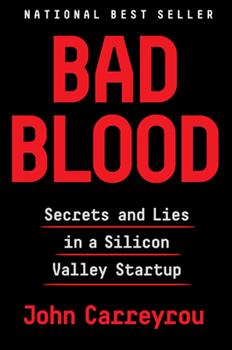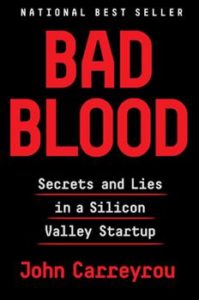

Good plan, Pat.
Theranos’s victims, Judge Davila said, include venture-capital firms Lucas Venture Group and Peer Venture Partners, and individual investors including Pat Mendenhall of U.S. Capital Advisors LLC; Richard Kovacevich, the ex-CEO of Wells Fargo & Co.; and Rupert Murdoch. Mr. Murdoch, who invested $125 million in Theranos, is the executive chairman of News Corp, which owns the Journal.
“We all screwed up,” said Mr. Mendenhall, an early Theranos investor who testified against Mr. Balwani. “I will never, ever invest in any company again without audited financials.”
This is from Heather Somerville and Christopher Weaver, “Balwani Gets 13-Year Sentence,” Wall Street Journal, December 8, 2022 (print edition.)
Balwani, in case you haven’t followed, was the president of Theranos, the firm that claimed to have a revolutionary blood test machine that . . . wasn’t. I’ve been following this since reading Bad Blood: Secrets and Lies in a Silicon Valley Startup, John Carreyrou’s excellent book on Theranos.
[Editor’s Note: See also Sarah Skwire’s review of Bad Blood at EconLog.]

READER COMMENTS
gwern
Dec 10 2022 at 11:36am
I understand the rationale behind charging them with some narrow financial thing (“everything in securities fraud”) but it’s still pretty bizarre. Surely the problem with Theranos was not the financials – they lost money, of course they lost money, that’s kinda the point of a startup – and the lack of ‘audited’ filings not the problem (was Rupert Murdoch not going to invest if Theranos lost $20m a year instead of $10m or whatever?), but the problem was that the machines, er, didn’t work and showed no sign of being in eyeshot of ever working at useful accuracies. That’s exactly the sort of thing some standard GAAP audits isn’t going to check!
David Henderson
Dec 10 2022 at 1:31pm
Good point.
Dylan
Dec 10 2022 at 11:36am
My work brings me close to VCs somewhat regularly. I’m amazed at the lack of due diligence from many of them. There’s a tremendous trust that the founders are telling the truth, which is they probably are the majority of the time, but still the lack of verification is kind of mind boggling.
I’ve not followed the Theranos story closely, they pitched to one of my colleagues years ago when they were just starting out and we didn’t take a 2nd meeting because he didn’t understand the tech and I didn’t hear about them again until they started to blow up. But, would audited financials have helped much? I thought it was the tech that was being misrepresented more than the financials?
And, if he will never invest in a company without audited financials, that means he will never invest in an early stage company again. Audited financials are expensive! Far out of the reach of most startups. It’s the kind of thing that companies only start doing after they’ve raised serious amounts of investment and are thinking about going public, not something a visionary with an idea can afford to do.
Jim Glass
Dec 10 2022 at 1:26pm
Why we trust fraudsters is an interesting take by a successful hedge fund manager-academic: Trust is valuable to people. Once investors invest in it emotionally they are very hard to convince otherwise with mere facts and reason. (Do we see this elsewhere?) In the Wirecard scam, investigators who visited its purported operating locations around the world reported finding only empty lots – yet still its shareholders and the German government believed.
Trust is valuable to society, as verifying is costly. Canada is one of the world’s highest-trust societies, which enhances both civil and business life there. Canada also is a hotbed of financial fraud. “There may be an optimal amount of fraud in a society that is non-zero.” … Victor Lustig pulled the ‘Eiffel Tower’ con on the French then came to America and conned Al Capone, no less. He had ‘Ten Commandments for Con Men’…
David Seltzer
Dec 12 2022 at 1:47pm
Due diligence means admitting what you don’t understand. Our hedge fund did not expand to include an oil trader simply because I didn’t really understand that market. It took me nearly six months of study before we hired an experienced trader. During the hiring process, we engaged another experienced trader who sat in on the vetting process. BTW. I’ve never bought any crypto currency because I don’t understand how that markets work or what block chains are.
David Henderson
Dec 12 2022 at 4:48pm
Admitting that you don’t understand is only the first step in due diligence. The second step, as you implicitly note, is getting understanding.
Comments are closed.